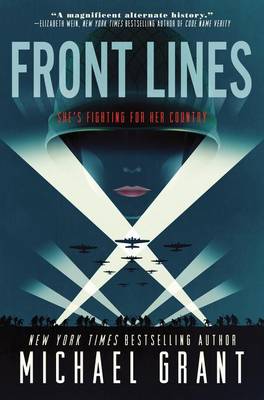
Liz (Bent Bookworm)
Written on Oct 5, 2016
[b:Front Lines|18743370|Front Lines (Soldier Girl, #1)|Michael Grant|https://d.gr-assets.com/books/1434989382s/18743370.jpg|26623929] is an alternate history of WWII. The big switch-up Grant has made is adding females to the draft and using them in ALL roles across the United States military (other countries have not made such an enlightened choice). Other than that change, the book is pretty much true to history – including attitudes towards women, people of color, and people of Asian features. It is at times harsh and heartbreaking, but the main characters of Rio, Frangie, and Rainy are sympathetic and compelling as they grow and adapt to the war and their changing roles in the world. They are not only dealing with the hard reality of being females in a still very patriarchal world, but with their own coming of age, of loss and love on a personal level, and all while being swept along in the grand scheme of the war.
The rituals are different now. It has always been that the men went off and the women wept and waved. There is no blueprint for what is happening now. There is no easy reference point. People don’t know quite how to behave, and it’s worse for the men in the station who are staying behind and feel conspicuous and ashamed.
God knows the MODERN United States Army is having a hard enough time getting a grip on itself with females in the ranks, but add to that the expectations of the generation that would become the idealogical 50s housewife – the book ends in about 1943, so with a couple more years left in the war, I’m very interested to see how this shapes Grant’s version of the United States in the sequel coming next year, [b:Silver Stars|30037861|Silver Stars (Soldier Girl #2)|Michael Grant|https://d.gr-assets.com/books/1467049903s/30037861.jpg|49196705].
We spend the most time with Rio, a gutsy farm girl who finds herself in the awkward and unwanted position of being good at her army job while in her heart, just wanting to be a normal girl. Her growth is the most marked of the three main characters and I love her so much.
She [Rio] has just upended her entire life based on a diner conversation with her best friend and an awkward exchange with a boy she barely knows.
The other two girls – because really, they are all still girls when the books starts – are lovable as well, but I felt the most connection with Rio. There is also an unnamed first-person narrator that shows up in the beginning, middle, and end, and has some succinct insights on the war and the women in it.
Will you understand if I tell you that there are times when it is better to feel the pain yourself than to see it and hear it in another?
[a:Michael Grant|1599723|Michael Grant|https://d.gr-assets.com/authors/1412040452p2/1599723.jpg] has, I think, either been in military service or he has done his research very, very well. His descriptions of Basic Training are spot on. His knowledge of the WWII era is commendable (I went and looked a few things up to see just how accurate he was, if it all, since sometimes historical fiction writers are VERY free with the facts) and he has altered as little as possible in his writing. He’s baldly honest with the racism and sexism of the time, enough to make me squirm in my chair. His descriptions of events are extremely accurate as we follow our heroines through their army journey from civilian to soldier.
The one thing that bothered me was the substitute of fug or fugging for fuck or fucking…it would be one thing if the entire book was censored that way, but the words dick (the male appendage, not the name) and goddamn are used without euphemisms sooooo…that was kind of annoying and pointless. And GOD KNOWS it’s every soldier’s right to swear. And grumble.
I loved how honest the portrayal of human nature was, and how emotions come so close to the surface during times of stress. Rio especially is torn between what she knows is waiting for her at home and what is happening in the right here right now.
Strand is there, close to her heart.
Jack is there, close.
As a medic myself, I loved Frangie and her fighting spirit, even in the face of soldiers being SO VERY HORRIBLE to her because of her race and her gender. She just never quits. But she never stops feeling, either, she just learns to put it aside at the time. I can’t wait to see her further development.
Rainy, our little intelligence soldier, felt the least realistic to me. Some of her dialogue exchanges are stilted and left me with raised eyebrows. I mean, I know it was WWII and there were a lot of green soldiers thrown into positions that ordinarily they wouldn’t have been…her storyline just seemed far-fetched at times. Almost like, well, we need this group to be here and we need them to meet up with her so let’s throw in this over-the-top mission that makes no sense to anybody. But maybe I’m just overly skeptical.
Don’t go into this expecting a happily-ever-after, or an exceptionally fast paced story. The first half of the book is fairly slow as we are introduced to all the characters and how they came to be in the army. As for the ever-afters, one – the war isn’t over, so we’re going to have to wait and see how things turn out. For another – it’s war, and people die, even the characters we’ve become attached to. Overall, 4/5 stars.
At night we cry sometimes, and if you think that just applies to the females then you have never been in combat, because everyone cries sooner or later. Everyone cries.


